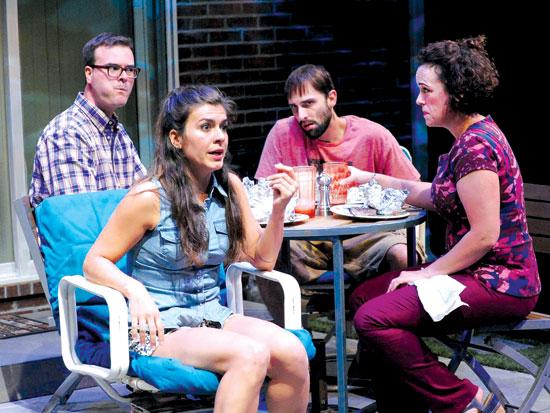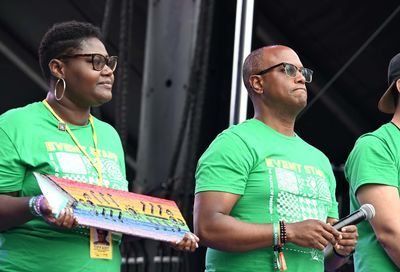On the Road to Nowhere
This tale of neighboring couples is a painfully real, painfully astute glimpse into the ailing American soul
Sometimes it’s all about the synergy. With Woolly’s Detroit, the power of the ride is not just in playwright Lisa D’Amour’s potently drawn prisoners of America’s lower middle class and the insidious crisis that engulfs them. It is the startlingly real portraits by a pitch-perfect ensemble; the aging, gaggingly bland, American suburb evoked in Tom Kamm’s sets; and the scene segues in which Erik Pearson’s unsettling retro projections and Christopher Baines’s distorted montage of suburban sounds amplify D’Amour’s message of confusion and despair. Though each may stand alone for their craft and imagination, together they transform a small stage into a living, breathing world humming with context and life – even if it’s one in which the average theatergoer would prefer not to live.

Detroit at Woolly Mammoth Theatre
And in some ways, that is the point. Who among the great swath of the American middle classes really does plan for a life in a faceless, nameless suburb that has seen better days? Yet it’s where we may find ourselves, and what we may or may not make of it is what interests D’Amour.
And thus, though it may be edged with a dark, ironic humor and an existentialist air, at the heart of this tale of neighboring couples, is a painfully real, painfully astute glimpse into the ailing American soul. Days not at work are filled with cheap furniture deals, mass-produced food and dreams delivered via lifestyle TV and themed chatrooms. And if life is one big nondescript cul-de-sac, it’s no wonder that drugs, alcohol and fantasy fill the potholes.
For established residents Mary and Ben, as for many of their demographic, economic pressures are gradually but relentlessly putting on the squeeze. Mary feels it most; the reality of her life – and her likely future – looming large as their resources shrink. But the pressure has triggered something else in Mary; a subterranean sense that something bigger, not just a second income, is now lost or missing. Whether she can fill the void with something real or manufactured hardly matters. Trolling for bargains at TJ Max is no longer enough.
With backyards literally within spitting distance thanks to the sardine-symmetry of their mid-century housing scheme, the restless Mary is eager to meet the new neighbors who have taken up residence in the house behind. Soon Mary and her affable, if awkward, husband Ben are playing hosts to the younger couple Sharon and Kenny, who quickly, if insidiously, begin to disrupt an equilibrium that is wobblier than a discount-store side table.
Anchoring the ensemble and haunting the memory is a superb Emily K. Townley as Mary. With seamless skill and color, Townley captures Mary’s beautifully written complexity: her urge to bring refinements to her life (even if the candle comes from a big-box store), her rigid bourgeoisie mores, the anger that lives beneath her conventional veneer and the nagging sense that something is amiss in her universe. Townley positively flows with this woman’s essence and her performance is bleakly electric.
Plenty for the brilliant Townley to play against, Tim Getman’s Ben captures with much nuance (and some good comic timing), the kind of American male who has dulled his surface to an unassailable but also an impenetrable gray. When this surface finally cracks D’Amour colors her theme further with the revelation of his tragic-comic inner landscape.
As seedily charismatic new neighbors Sharon and Kenny, Gabriela Fernandez-Coffey and Danny Gavigan make a very convincing pair, with Fernandez standing out for giving Sharon the potently doomed energy of an unguided missile. Gavigan injects Kenny with just the right amount of agitation, defeat and dubious edge, though there is a slight unevenness that begs a bit more experience. Though they offer a brand of modern ne’er-do-well that has featured much in recent media memory (one thinks if Jesse in Breaking Bad), their understated, un-stylized portrayals keep these two as uncomfortably real as they need to be. This is no small feat, as these two must drive some of D’Amour’s more intense and sometimes surreal moments, some of which threaten the suspended disbelief.
And here is where director John Vreeke comes in. Though his working of the humor, emotion and interactions of the first two-thirds of the play is superbly, tautly paced, the dramatics of the last third are the challenge. Even with some clever choreography, technical prowess, and his actors’ intense energy, he cannot quite get past a certain staginess and the emotional, if not the physical, momentum suffer.
This penultimate struggle makes D’Amour’s end-scene monologue of the old-timer Frank feel more than ever like an off-beat epilogue. Though Michael Willis does his best to inject Frank with a suitable realism, he adds nothing to the power of the play that has come before. And though Frank’s nostalgic memories of the subdivision give some kind of context to Kenny’s – and perhaps the cultures’ – dissolution, its suggestions are too easy, too shallow. Maybe there was a sense of community “back in the day,” but it clearly didn’t serve Kenny’s mother – or the mothers of all the other young adults haunting the nation’s strip malls, clubs and temp agencies like the walking dead.
And yet, even with this caveat, Detroit is a masterpiece of suburban gothic that leaves one wondering, among other things: Are self-limiting minds drawn to symmetrical subdivisions, or do symmetrical subdivisions breed self-limiting minds?
Support Metro Weekly’s Journalism
These are challenging times for news organizations. And yet it’s crucial we stay active and provide vital resources and information to both our local readers and the world. So won’t you please take a moment and consider supporting Metro Weekly with a membership? For as little as $5 a month, you can help ensure Metro Weekly magazine and MetroWeekly.com remain free, viable resources as we provide the best, most diverse, culturally-resonant LGBTQ coverage in both the D.C. region and around the world. Memberships come with exclusive perks and discounts, your own personal digital delivery of each week’s magazine (and an archive), access to our Member's Lounge when it launches this fall, and exclusive members-only items like Metro Weekly Membership Mugs and Tote Bags! Check out all our membership levels here and please join us today!

























